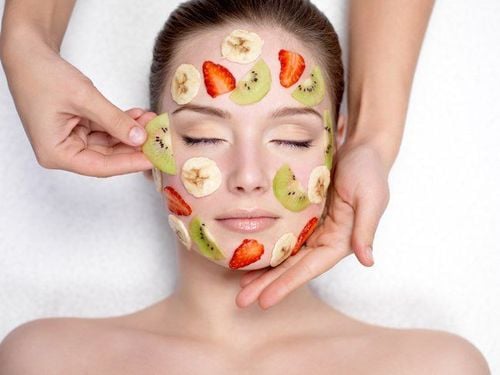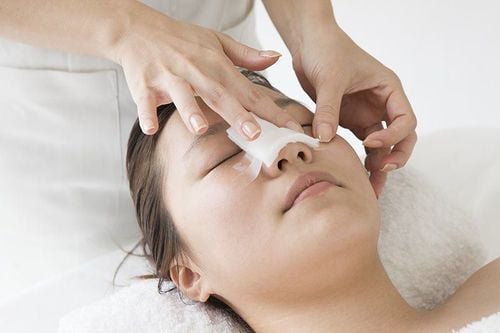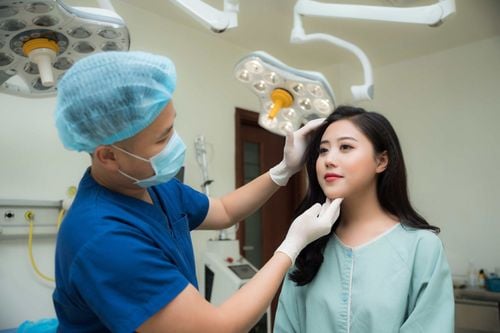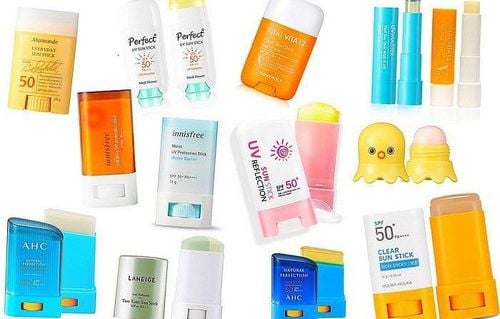This is an automatically translated article.
Stepping past the age of 30, each person is more mature, full of knowledge and life experience but will also come with a series of skin problems. As we age, the skin quickly ages, but the effectiveness of the treatment will decrease again. Therefore, it is important to know how to take care of your skin after the age of 30 specifically and suitable for yourself for long-term maintenance.1. What happens to the skin after the age of 30?
Loss of elasticity: After a certain age, the elasticity of the skin will be limited. This causes dead cells to accumulate on the surface of the skin, leaving you with a lack of radiance. Dry skin: A person may or may not have had characteristics of dry skin in the past. However, the skin tends to dry out after the age of 30 due to the gradual decrease in sebum production. The appearance of signs of aging: Skin is made up of protein fibers with a certain elasticity and strength. As the body ages, the production of these proteins in the skin also slows down. At the same time, UV exposure can also contribute to a decline in the production of proteins. Appearance of Hyperpigmentation: A person may notice dark spots caused by hyperpigmentation on the skin, called freckles or age spots, as they age. This happens due to years of sun exposure, which stimulates cells to rapidly overproduce melanin. Increased sensitivity on the skin: As we age, the body's oil production slows down. This can lead to changes in each skin type. Most people will notice that the skin becomes less oily than before. The condition can also lead to increased sensitivity in the skin, leading to an allergic reaction to almost anything that the skin touches. Puffy eyes and dark circles: As people approach the age of 30, people may notice puffiness under the eyes and dark circles. This is due to a decrease in the production of collagen and elastin elastic fibers in the skin. It is collagen and elastin that keep the skin strong, intact and firm.
2. Skin care guide after the age of 30
Besides being caused by time, stress can make skin look dull, less youthful than in your 30s. Stress at work, taking care of children or family can make it difficult for a woman to maintain healthy skin.
With the changes in the skin that appear after 30-35 years old as above, each person needs to build a proper skin care routine as follows:
2.1. Building a healthy diet Choosing fresh foods for processing, drinking enough water can keep the skin young and limit the phenomenon of dry skin. In addition to water-rich foods, a low-carb diet can also help improve the appearance of wrinkles and change the texture of your skin.
2.2. One of the main causes of dull looking skin after the age of 30 is the accumulation of dead cells on the surface of the skin. As a result, regular exfoliation is a post-30s skin care routine, helping to reveal new, healthy cells for a smoother and younger-looking face.
2.3. Daily moisturizing of the skin Moisturizing the skin with the right moisturizer will help improve hydration in the skin. This makes the skin softer and brighter.
Exposure to ultraviolet rays over the years can cause some damage to the skin barrier. At this point, using a moisturizer will help repair the barrier, strengthen the protective layer and lock more moisture in the skin.
2.4. Get enough sleep for healthy skin Sleeping at least 7-8 hours a day without interruption is also a good skin care habit after the age of 35. Because lack of sleep can lead to puffy and puffy eyes, formation of dark circles, dull skin.
2.5. Use an anti-aging cream Anti-aging cream is hydrating and contains essential ingredients to help limit the signs of aging on the skin. Look for these ingredients when you're shopping for an anti-aging cream for post-30s skin care. Examples are:
Retinoids: Retinoids are vitamin A derivatives and have been used in dermatology. The role of this ingredient is to fight damage caused by the sun on the skin and help stimulate the new layer of cells to quickly grow and mature. Vitamin C: A common ingredient in most beauty products is vitamin C. This vitamin fights free radicals and prevents the breakdown of collagen and elastin in the skin. Hydroxy Acids: These act as exfoliators and help skin look brighter. Niacinamide: As a form of vitamin B3, niacinamide can prevent the skin from losing water. Hydrated skin will look healthier and younger. Serum: Helps cleanse and leave skin looking more radiant. 2.6. Specialized monthly skin care Skin care with dermatologists helps to increase hydration and blood flow. This is also a good way to maintain healthy, youthful skin in your 30s - 35s.

Ngủ ít nhất 7-8 giờ mỗi ngày là một thói quen tốt chăm sóc da sau tuổi 30.
2.7. Do physical exercises Exercise is extremely beneficial to keep the skin looking young and healthy. You should spend at least an hour a day working out in the gym or playing your favorite sport, like swimming or yoga.
2.8. Use an eye cream The skin under the eyes is very sensitive and can be the first place to show signs of aging. Wrinkles and crow's feet can be minimized by using a quality eye cream. They are often rich in ingredients that boost collagen and elastin production, maintaining your skin's firmness and smoothness.
2.9. Use sunscreen Sunscreen is a mandatory cosmetic to use when going out and at risk of exposure to the sun, regardless of age. UV damage contributes to collagen and elastin damage, causing wrinkles to appear under the skin after the age of 30.
2.10. Using the right skin care products from the age of 30, the skin has many changes compared to before. People may notice dry skin, increased irritation, and more hyperpigmentation spots. Therefore, using skin care products will help increase moisture, maintain youthfulness in a sustainable way for the skin.
In short, people face a lot of changes as they get older. All activities in daily life, years of UV exposure, lifestyle changes and ups and downs can affect the skin. Therefore, you need to have a skin care routine after the age of 30 appropriately.
Please dial HOTLINE for more information or register for an appointment HERE. Download MyVinmec app to make appointments faster and to manage your bookings easily.
References: Womenshealthmag.com, Parenting.firstcry.com, Skinkraft.com













